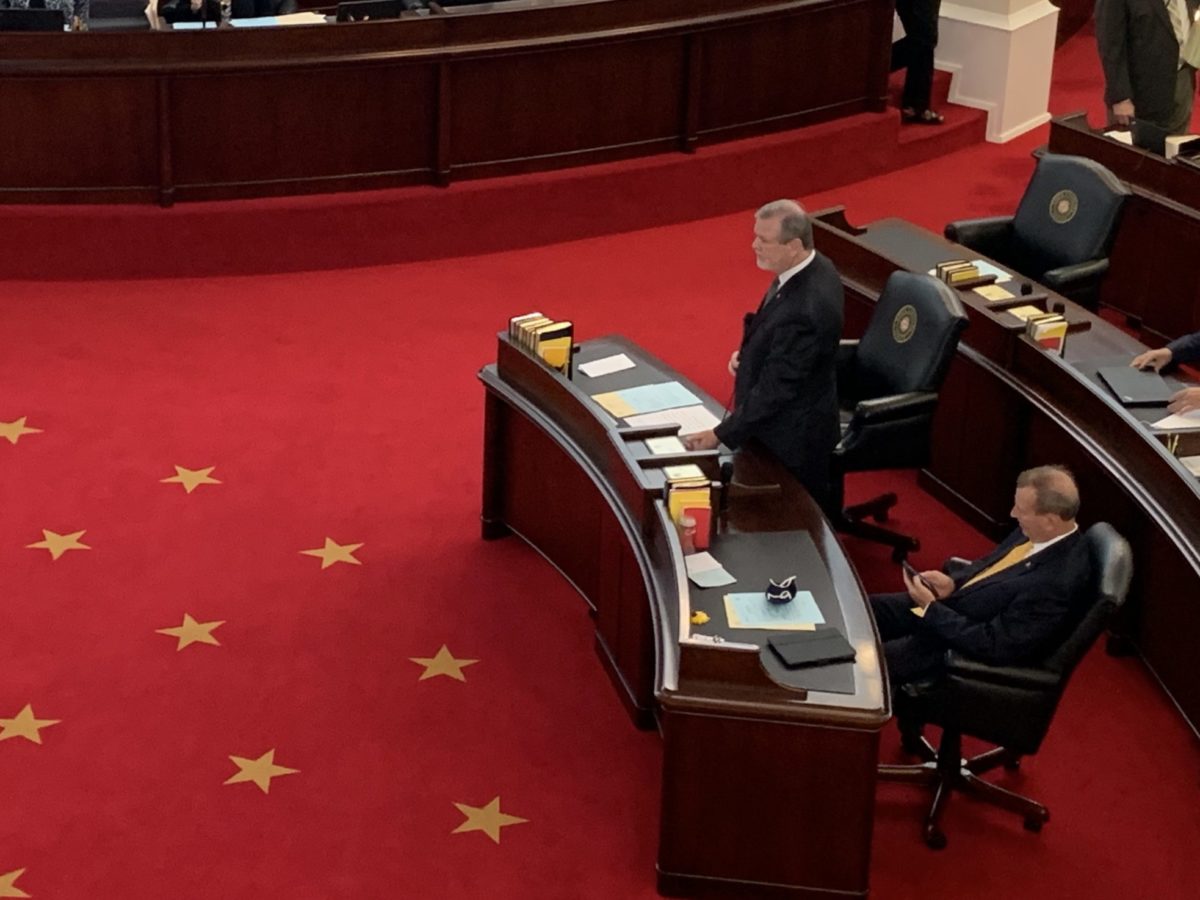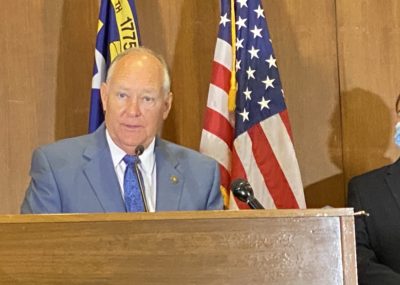
Updated 4:45 p.m. on Sept. 9, 2020
House Bill 1105 passed the General Assembly on Thursday with a 104-10 concurrence vote by the North Carolina House of Representatives.
In introducing the bill to his House colleagues, Rep. Dean Arp, R-Union, called the legislation necessary.
“It is our intent that no teacher will lose their job,” Arp said, expressing particular pride over the bill’s provision that holds local education agencies harmless for enrollment declines this year. “So in order to do that, the average daily membership will be held harmless. The State Board of Education is directed to not reduce the allotments of public school units based on differences in the anticipated and the actual daily student membership. By doing this for both the public schools and the charters, we believe that no teacher should lose their job.”
The bill is now headed to Gov. Roy Cooper’s desk for his signature or veto. Cooper’s spokesperson Dory MacMillan said the bill is under review.
“The Governor is pleased that legislators followed his recommendations to maintain funding for school enrollment and invested in important areas like broadband, but they could have done much more to help North Carolinians in need,” MacMillan said in a statement released Thursday afternoon. “Most important, the bill should have expanded Medicaid to give 600,000 working people health care and done more for struggling small businesses and unemployed people as the Governor’s budget recommended. Legislators are leaving funds on the table and people in the lurch in a time of great crisis. The Governor will continue to review the bill.”
In addition to provisions highlighted in the article below, here are some other public education-related measures for K-12 and community colleges contained in the bill:
- $22 million for DPI to award as grants to public school units for serving exceptional children who have lost critical services as a result of school closures related to COVID-19, of which DPI is encouraged to use $17 million for in-person services (Section 3.3(64))
- $250,000 to Sampson Community College to address impacts related to COVID-19 (Section 3.3(80)(e))
- $150,000 to the Steve Smith Family Foundation for use with virtual learning support program that assists homeless students (Section 3.3.(82))
- $5 million to the Community College System Office for allocation to various campuses for PPE or COVID-19 testing (Section 3.3(83))
- $1.1 million to DPI for allocation to Communities in Schools of North Carolina, Inc. for staff PPE or to assist K-12 students with remote instruction, nutrition, family support and mental health (Section 3.3(89))
- $115,000 to DPI for allocation to Mount Airy City Schools to establish a Smart School Bus Safety Pilot Program (Section 3.3(90))
- $1 million to DPI for allocation to Alamance-Burlington Schools for COVID-19 related expenses including school nutrition, transportation, technology, remote instruction materials, and PPE (Section 3.3(91))
- $500,000 to DPI for allocation (according to ADM) to school districts in Bertie, Camden, Chowan, Perquimans, Tyrrell and Washington counties for COVID-19 related expenses including school nutrition, transportation, technology, remote instruction materials, and PPE (Section 3.3(92))
- $5 million to the Community College System Office for allocation to various campuses for equipment costs for healthcare workforce and first responder programs (Section 3.3(93))
- $1 million to the Community College System Office for allocation to Cleveland Community College for PPE (Section 3.3(95))
- $1 million to DPI for Gaggle safety management products to enhance student safety during virtual learning (Section 3.3(100))
- $300,000 for a student health collaborative pilot program allowing school districts to work with county departments of social services to assist students with mental and physical well-being (Section 3.3(109))
The North Carolina Senate passed House Bill 1105 on Wednesday, which includes $1.05 billion in federal funds for COVID-19 relief as well as a provision that will prevent districts from facing budget cuts due to a decline in enrollment.
That provision — a hold harmless for average daily membership — has been sought by district leaders around the state in the lead up to this week’s session.
“We are the support system for so many students and families, especially in places where the economy of scale is not present to buffer shortfalls …” said Aaron Greene, superintendent of Polk County Schools, in response to a survey from EducationNC. “Our families need us more than ever in this uncertain time. Removing resources from our students and community would certainly be detrimental.”
Average daily membership (ADM) gives the state an idea of how many students are in schools. Districts are funded based on their projected ADMs. If the actual ADM ends up being lower, they can face budget cuts.
For a primer on what ADM is, check out Watauga County Schools Superintendent Scott Elliott explaining it below.
Aron Gabriel, superintendent of Newton-Conover City Schools, also responded to the EducationNC survey, explaining why the ADM hold harmless is essential for his school system.
“(It) would allow our funding to remain constant given the unique circumstances in which we find ourselves. As conditions improve relative to the virus, we anticipate more students returning to our schools. Because of the 10-day headcount occurring when it does, we won’t get credit for these students who enroll after that window going into the 21-22 school year. Because the majority of the COVID-19 relief funds will have been exhausted prior to the 21-22 school year beginning, the need for state funding to remain constant is even more important.”
Virtual charter expansion and ADM implications
The legislation also allows the state’s two virtual charter schools to enroll up to an additional 3,800 students, which would require a total of $22 million in funding.
It is not clear how the virtual charter enrollment increases, transfer of per-pupil funding to charter schools, and the ADM hold harmless provision interrelate.
Sen. Brent Jackson, R-Duplin, said the language in the bill should be broad enough for DPI and the State Board of Education to adjust its policies to minimize undue harm to all public school units.
The State Board is expected to discuss the issue Thursday.
What else is in the bill?
The bill provides $10 million in additional funding for student connectivity, $20 million for personal protective equipment, and $1 million for the new teacher support program, but these allocations fall short of the additional funding requests the State Board of Education made to a House committee last week.
The bill also provides no funding for the State Board’s requests around transportation, the science of reading, school-based mental health, and the Space X Pilot program.
On the Senate floor, several Democrats argued that the bill was insufficient.
“We have an $85 million unused surplus in what we call our Opportunities Scholarship Fund. This is unused money. And, as we all know, state revenues are way down this year because of the pandemic. And the needs are so great, there are so many needs that we should be addressing,” said Sen. Natasha Marcus, D-Mecklenburg.
Senate Republicans praised what the bill does for public education. Sen. Deanna Ballard, R-Watauga, noted that the bill allocates more than $50 million to the state Department of Public Instruction (DPI) in addition to the $670 million that has previously been allocated by the state for education.
One of the most-touted aspects of the bill is $440 million in federal COVID-19 relief funds to give $335 to every family that has at least one child, though this wasn’t a big topic of debate in the Senate.
The bill also includes increased funding and eligibility for school choice options and child care centers, both of which were a larger focus of conversation.
School choice provisions
“The science is clear, the science is overwhelming that keeping kids out of classrooms is harmful, and some students may never recover,” Senate President Pro Tempore Phil Berger, R-Rockingham, said during a press conference today. “That’s not hypothesis or theory, some students will not recover. So now more than ever it should be a time when, like parents, leaders in North Carolina embrace parental school choice.”
The bill allocates $6.5 million to the Special Education Scholarship Grants for the Children with Disabilities Program and the Education Savings Account Program. These programs provide funding to families who want to send their children to private school. The funding would pay for the approximately 2,500 families currently on waitlists for the programs.
“It is unconscionable that school districts aren’t providing students with special needs the support they’re promised. We’ve all had to make sacrifices because of this pandemic, but we should not be sacrificing children’s futures,” Sen. Joyce Krawiec, R-Forsyth, said.
A second school choice measure in the legislation is easing requirements so that students can qualify for opportunity scholarships if their family is at 150% of the amount of money required for a student to qualify for free- or reduced-price lunch. Currently, that threshold is at 133%. Opportunity scholarships give up to $4,200 per year to students who enroll in private school.
The legislation also removes the cap on the number of kindergarten and first grade opportunity scholarships that can be given out each year.
Marcus took issue with using taxpayer dollars via this bill to ease restrictions on eligibility.
She noted that the bill’s eligibility changes do not specify an allocation amount, meaning there is no cap on how many dollars might be used for opportunity scholarships under the expanded eligibility requirements.
Child care provisions
In addition to $35 million for child care assistance, the bill also provides flexibilities for certain child care licensing requirements, allowing community-based organizations to provide care for school-age children at a remote learning facility.
Under the bill, a community-based organization is one that “demonstrated effectiveness that are representative of a community or significant segments of a community that provide educational or related services to individuals in the community, such as parks and recreation programs, YMCAs, YWCAs, and Boys and Girls Clubs.”
The bill allows these groups to provide child care in a building or space used to house school-age children during the school year for the purpose of facilitating online or remote learning.
Sen. Terry Van Duyn, D-Buncombe, moved to amend the child care portions of the bill to challenge some of the flexibilities, saying regulations such as background checks, TB tests, fire inspections, and first aid certification should not be relaxed.
“These are common sense amendments that continue to provide the flexibility we’re looking for,” she said, “But balancing that with safe child care so that our parents can work knowing their children are safe.”
Sen. Jim Perry, R-Lenoir, opposed the amendment, saying he understood why the regulations would be good under ideal circumstances, but that the pandemic has not created ideal circumstances.
“This wasn’t written for pandemic times, it was written for idealistic times,” he said about current child care licensing regulations. “But this isn’t working for working North Carolinians now.”
The amendment was tabled by a 28-21 vote.
This legislation is the second round of COVID-19 relief taken up by the General Assembly and passed the Senate by a 44-5 vote. It is expected the House will vote to concur tomorrow.

